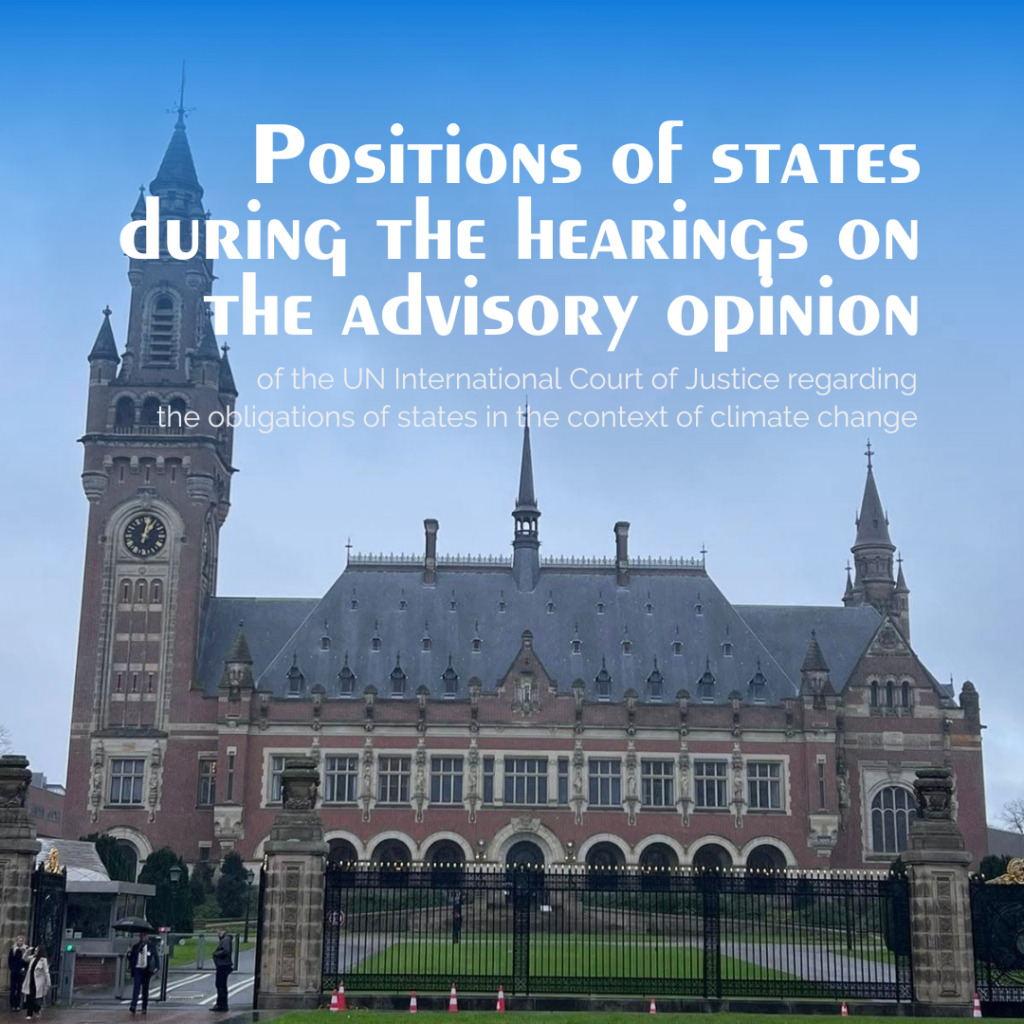Previously, through its information channels EPL has already informed about the launch of public hearings on the advisory opinion on the obligations of states in the context of climate change at the UN International Court of Justice in The Hague. The hearings lasted from December 2, 2024 until December 13, 2024. Representatives of states, international organizations and non-governmental organizations were involved in the discussion and presented their positions on issues of responsibility for the climate crisis.
The issues raised at the hearings cover legal aspects of the responsibility of states for impact on the climate, defining the obligations of states in the context of combating climate change.
During the hearings, special attention was paid to the principle of preventing significant environmental damage and obligations of states to preserve the marine environment.
Participants in the hearings included representatives of the European Union, the African Union, the International Union for Conservation of Nature, the Alliance of Small Island States and other key players in international environmental law.
This case was initiated at the request of the UN General Assembly adopted on March 29, 2023 in resolution A/RES/77/276. Among the materials submitted there are 91 written statements and 63 comments from states and organizations. The issues raised in court concern key international treaties including the Paris Agreement, the UN Framework Convention on Climate Change, the UN Convention on the Law of the Sea, and the Universal Declaration of Human Rights.
This case is one of the largest climate cases in history, driven by the states most affected by the effects of climate change, particularly small island states.
Although the advisory opinion will not have binding legal force, it could significantly influence international law, strengthen the responsibility of states and serve as the basis for future climate lawsuits. Island states such as Vanuatu hope it will help hold developed countries accountable for the damage caused by their actions, including historically high levels of greenhouse gas emissions.
Since the hearings lasted until December 13, and the decision is expected in 2025, below you can see positions of some states that have already expressed their positions:
Mexico, Micronesia, Myanmar, Namibia, Nauru, Pakistan, Nepal: argued for the need to hold states accountable for their cumulative emissions.
Japan and New Zealand: argued in favor of states avoiding legal responsibility for climate damage.
Jamaica, the Maldives, Papua New Guinea and the African Union: called for climate compensation, including debt relief and ensuring state sovereignty for the most affected countries.
Kuwait: defended the use of fossil fuels, rejecting commitments to phase them out.
Latvia and Liechtenstein: expressed solidarity with small island states, supporting their right to self-determination and a safe environment.
Ghana, Grenada and Sierra Leone: called for debt relief as a form of climate reparations, highlighting the “vicious cycle” of borrowings for rebuilding after climate disasters.
Cook Islands, Marshall Islands and Solomon Islands: argued that climate change threatens the sovereignty of small island states, exacerbating historical injustice.
The United States of America, Denmark, Finland, Iceland, Norway and Sweden: insisted on a minimal approach to the climate obligations of states, limiting themselves only to the framework of the Paris Agreement, avoiding broader obligations.
Costa Rica, El Salvador, Spain and Fiji: declared that reducing greenhouse gas emissions is a key element in protecting human rights in the face of climate change.
Canada: tried to downplay the importance of human rights in the context of climate action, but faced criticism from Chile, the Philippines, Cameroon, Colombia and Bolivia, who emphasized the need for intergenerational justice.
China, Brazil: talked about equality between states, but spoke in favor of states avoiding responsibility for climate damage.
Belize, Chile: expressed the view that environmental law should encompass both preventive measures and restorative justice.
Vanuatu: a call for climate justice, self-determination and accountability.
Germany: talked about its leadership in climate policy, but the speech was against establishing the right to a clean environment.
All these examples clearly demonstrate a deep gap between the declared intentions and the real actions of the states in the international arena. While some countries dare to stand up for justice, self-determination and climate responsibility, others continue to protect interests of big polluters, endangering future of the planet. Such divergence emphasizes the urgent need for global solidarity where words become actions and declarations become real changes to protect the environment and ensure sustainable development for all. We continue to follow the progress of the hearings and the position of the UN International Court of Justice on this issue, hoping that the UN ICJ will form a clear and fair position.


